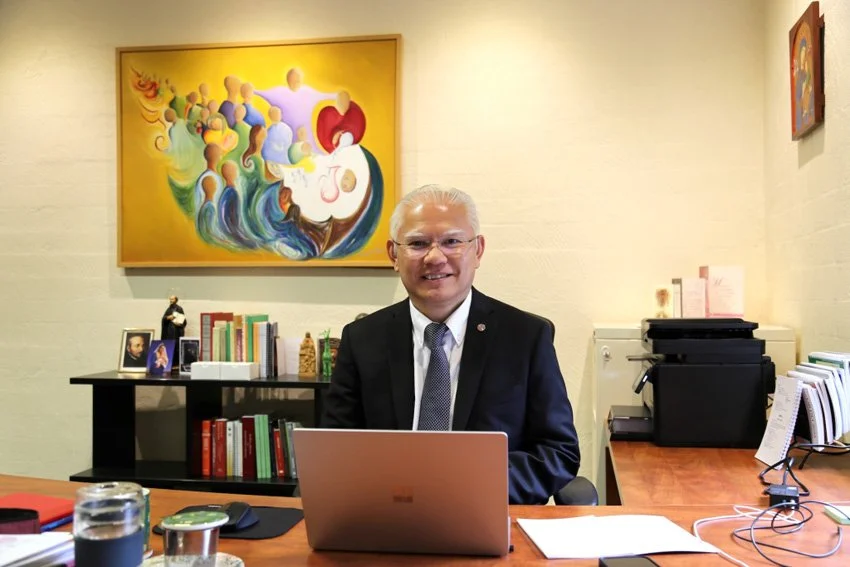In 1979, the ten-year-old boy became a refugee. Separated unexpectedly from his parents at night, he and a younger brother were among 67 people crammed into a fishing boat. They ran out of food and water and pirates came aboard twice. Two weeks later, after another lad his own age died of dehydration, the boy thought he and his brother might be next. After 19 days, the fishing boat arrived in Malaysia and the siblings were taken to a refugee camp.
Yet that trauma was actually the conduit to inner peace.
Australian Jesuits Provincial Fr Quyen Vu SJ. PHOTO: Australian Jesuits website.
The boy and his brother moved to Australia and were reunited with their family.
Later, he graduated from the University of New South Wales and began working in the IT field. “I worked weekdays, sitting in front of a computer with very limited human contact. Each Saturday, I went out with my friends but every Sunday I went to church because I was a member of the Bankstown choir.
“And then each Monday I would go back to work. After a couple of months I realised, ‘My life needs to be more meaningful than this’.”
Having spent time observing some religious orders, he attended a Jesuit “come and see weekend” in Sydney in 1993 and instantly recognised the Society’s “very interesting balance of contemplation and action.”
Looking back, he says, “That philosophy really made a connection with me. More than anything else, I wanted to give back to humanity and to serve the poor, to be a missionary and to do something that was meaningful and purposeful. Joining the Jesuits meant that I could do something that gives me life and purpose.”
He became a Jesuit in 1994. Today, Fr Quyen Vu SJ is the Australian Provincial.
Prior to taking on this role, he spent twelve years overseas, first building a new Jesuit school in Timor-Leste and then doing the same in Cambodia. His life’s direction, he says, has been the result of surrendering to God’s will in a way that has shaped his journey.
“When people say to me ‘You should go and do a Ph.D,’ I say no, I’d rather be doing what I possibly can for others. In Timor-Leste and Cambodia, I would be the first person at the school and the last person to leave. For me, education is a way to help poor people, young people, not only for the individual to transform his or her life, but for the family as well, and for the community and the country.
“In both Timor-Leste and Cambodia, our former students are now blossoming into young leaders in their community. Some of those from the first graduating class in 2022 in Cambodia are doing nursing and teaching, they are also utilising their skills during their holidays to go back to their own villages and teach other kids who are actually illiterate. That commitment is amazing, as is that level of transformation. You see that flow-on effect not only for that person but for others around them in the community.”
When Fr Quyen prays each day, what is the prime thing he give thanks for? “For me, it is a sense of peace,” he says. “Without that peace, Ignatian discernment becomes a much more difficult process. During my formation, our retreat director always reminded us not to make decisions if you are in desolation and equally, not to make decisions when you are in consolation. If you do so, your emotions will override everything else.
“You need to do this when you are at peace, when you are not affected by emotion, by relationship, by constraint or even by people trying to push you in a particular direction. That’s precisely why I pray for that sense of peace – so that I can make good decisions in the right frame of mind. Prayer is important, while God’s guidance is paramount.”
This article by David McMahon, Communications Manager, Society of Jesus in Australia, was published on the Australian Jesuits’ website.

